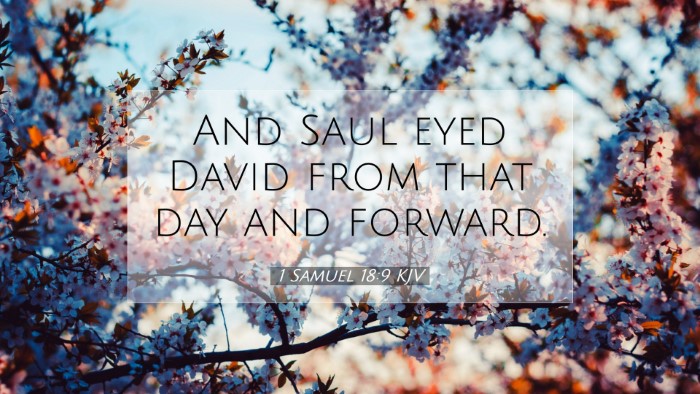Commentary on 1 Samuel 18:9
Verse: "And Saul eyed David from that day and forward." (1 Samuel 18:9)
Contextual Overview
The passage of Scripture found in 1 Samuel 18 marks a pivotal moment in the relationship between Saul and David. Following David's triumph over Goliath in 1 Samuel 17, David's popularity began to soar. Saul, the king of Israel, finds himself increasingly threatened by David's rising status and the praises that the people sing regarding him.
The jealousy that begins to consume Saul is pivotal for understanding his later actions throughout the narrative. This verse encapsulates the essence of the conflict that will tragically unfold between these two figures.
Insights from Public Domain Commentaries
Matthew Henry’s Commentary
Matthew Henry reflects on the psychological transition Saul experiences at this juncture. He notes that Saul's initial affection for David is overshadowed by a growing envy that soon leads to hostility. Henry emphasizes the significance of "eying" here, suggesting that Saul's gaze represents a deeper preoccupation with David's success. This jealousy, Henry argues, serves as a cautionary tale about the destructive nature of envy.
Furthermore, Henry illustrates how Saul's emotional state deteriorates due to his inclination to compare himself to David. He highlights the importance of guarding one's heart against such feelings, as they can spiral into destructive patterns. Henry points out that this moment reveals how favor and fame can provoke feelings of inadequacy and resentment in those who feel threatened by them.
Albert Barnes’ Notes on the Bible
Albert Barnes provides a thorough examination of the implications of Saul's actions in this verse. He suggests that "eying" David signifies not merely watching but an intense scrutiny that betrays Saul's growing paranoia. This vigilant observation points to an underlying fear that David's increasing renown will result in a challenge to his throne.
Barnes further clarifies that Saul's fears are unfounded as David had no intentions of usurping Saul’s position. Instead, David served Saul valiantly. Barnes articulates a deeper theological reflection, drawing parallels with the way leadership can become insecure when not grounded in God's assurance and intention. He notes that legitimate leadership requires confidence in the divine call rather than a constant comparison with others.
Adam Clarke’s Commentary
Adam Clarke’s analysis of 1 Samuel 18:9 delves into the emotional and spiritual implications of Saul’s 'eyeing' of David. Clarke elucidates how Saul’s jealousy renders him incapable of perceiving David's heart and intentions, portraying a stark contrast between their characters. While David is depicted as humble and dedicated, Saul's spiraling jealousy blinds him to the truth.
Clarke also highlights that this verse marks the beginning of a profound psychological decline in Saul. He links Saul’s growing suspicion and obsession with David to the eventual consequences of disobedience to God’s commands. Clarke invites the reader to ponder how jealousy can lead to irrational behavior and estrangement from those whom God blesses.
Theological Implications
This verse serves as a poignant reminder of how envy can corrode relationships and leadership. The example of Saul illustrates the vulnerability of even the most prominent leaders to emotional and spiritual challenges. The psychological dynamics captured in this moment resonate deeply in both personal and corporate settings, highlighting the need for humility and grace.
For pastors and theologians, Saul’s fixation on David offers a vivid lesson on the importance of abiding in God’s presence, seeking His approval above all else, and recognizing the grace extended toward others. Furthermore, this passage raises essential questions about how leaders can cultivate healthy relationships within their contexts, avoiding the pitfall of comparison that leads to jealousy and conflict.
Practical Applications
- Self-Reflection: Ministers should routinely assess their motivations and feelings toward others, particularly those who may compete for attention or recognition within their ministry.
- Encouragement of Others: Instead of succumbing to envy, leaders should actively foster the gifts of those around them, celebrating their successes as an extension of personal ministry.
- Maintain Focus on Calling: Followers of Christ should concentrate on their individual callings and purposes without becoming distracted by the accomplishments of others.
- Prayer for Humility: Regular prayer for humility and grace can aid leaders in resisting jealousy and fostering an environment of unity and support.
- Community Building: Engage in practices that build community rather than division, encouraging collective rather than individual accolades.
Conclusion
In conclusion, 1 Samuel 18:9 serves as a critical reflection point on the nature of the human heart in the context of leadership and relationships. The insights gleaned from commentaries remind us of the dangers of jealousy, encourage humility, and prompt us toward an intentional commitment to lift one another up within the body of Christ. By examining Saul's envy of David, we can see the necessity of focusing our hearts on the goodness of God and the purposes He sets before us, fostering a spirit of celebration rather than comparison.


